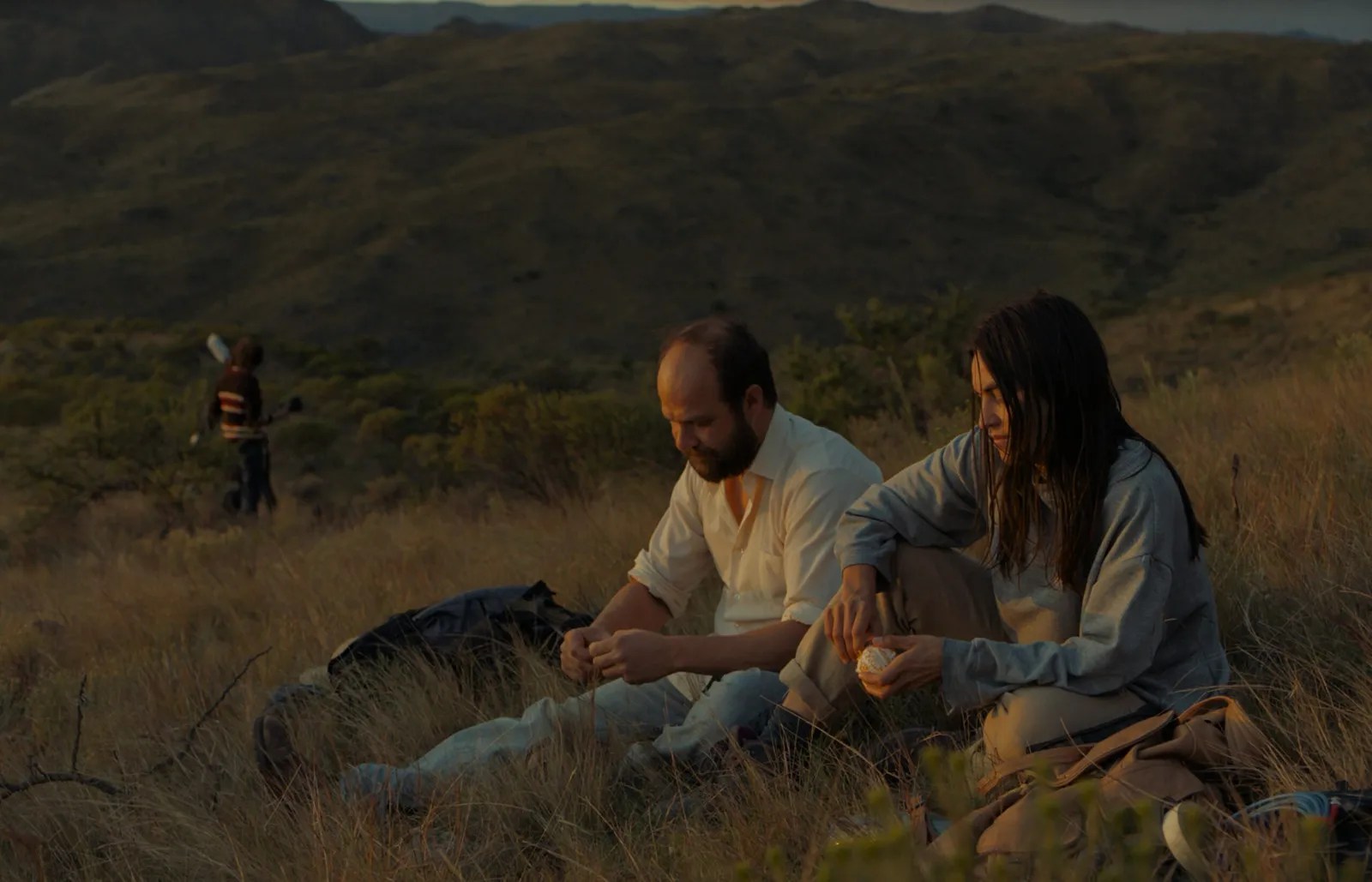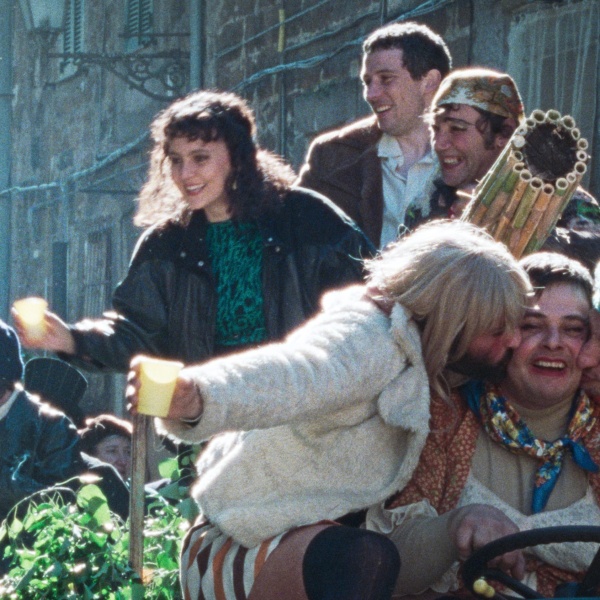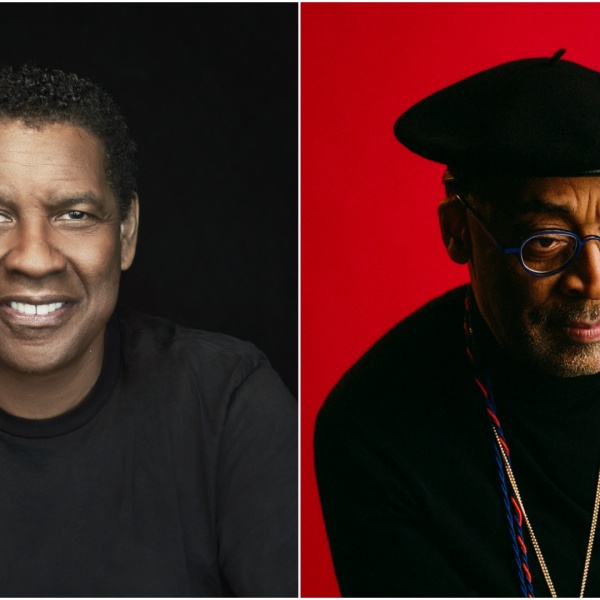
Arguably the first slow cinema heist movie, Rodrigo Moreno’s dreamy and discursive “The Delinquents” might kick off with one of the most low-key bank robberies anyone has ever attempted, but it’s hard to overstate how thrilling it feels once the thief finally tells us about what he stole.
Morán (Daniel Eliás) is a middle-aged employee at a musty Buenos Aires bank that seems to have gotten stuck in the 1970s — a fitting touch for a workplace that functions as a repository for lost time. People start there when they’re young, only to wake up in the same place some 55 years later and realize that the job they performed to help pay for their life has actually become their life somewhere along the way. When the sun rises on Morán’s apartment in the morning, his colorless uniform is already laid out on the chair next to his bed as if it were his body, and he were merely its ghost. Maybe that explains why he’s all but invisible to his colleagues at the bank, who don’t pay Morán even the slightest bit of attention as he stacks a few dozen bricks of American cash out of the vault and into his backpack.
Later that night, while having some fast food with his co-worker Román (Esteban Bigliardi), Morán will explain that he stole precisely $650,000, which is exactly twice as much money as he would earn before retirement if he worked every day for the next quarter of a century. He plans on turning himself in, but not before offering Román an even split of the money if his colleague agrees to hide the money for the duration of his prison stint.
It’s just basic math: For the same payout, Morán could either spend three years in jail, or 25 years at the bank. He doesn’t want to be rich, he just wants to be free. Free from capitalism, free from its lopsided farce of a work-life balance, and free from the strictures of conventional thinking, which don’t just affect our schedules but also how we see the world itself. That might seem a foolish goal in a film less creatively unbound than the one Moreno has made here, but this playful three-hour reverie is so happily unmoored from the expectations of everyday storytelling that it’s tempting to think Morán might not be tilting at windmills after all.
Short by the standards of some recent Argentinian cinema, but still breezy and unhurried in a way that invites your mind to wander around without being leashed to the usual obligations of plot, “The Delinquents” is less interested in the details (or dramatic consequences) of Morán’s theft than it is in how the very idea behind it begins to remap Román’s entire worldview. The gym bag full of money that he stuffs into his bedroom closet doesn’t provoke his greed so much as his imagination. The cops never really cotton on to what happened, and neither of Moreno’s lead characters are made to feel like the walls are closing in on them.
On the contrary, “The Delinquents” cleverly inverts the average heist movie by lifting the veil off its characters’ eyes and expanding their concept of what’s possible — gradually at first, and then with such delirious force that Morán and Ramón threaten to come unglued from reality. That their names are anagrams for each other reflects the film’s lightly cosmic interest in the mysteries of the universe; that it also sets up a laugh-out loud Marvel joke reflects the film’s warm-dry sense of humor. While “The Delinquents” was pointedly made to provoke active viewing and push back against the algorithmic storytelling that has choked the life out of modern cinema, its airiness and emergent sense of romance make it a delightful place to get lost for a while.
When we’re first introduced to Morán, he’s determined to escape the rat race in which the first thing people ask each other is invariably some variation on “what do you do for work?,” as if that were the only meaningful way of assessing someone’s value. So much as “The Delinquents” can be strictly defined as a film about anything, it’s a film about the search for a better question. Answers are off the table here, all the way through the movie’s wide, wide, wide open ending, but that frame of reference expands a bit further with every passing scene.
The thing is that work was never a particularly meaningful index for identity in the first place. Ramón had been an employee at the bank for years, spending more time with his colleagues than he does with his family, and yet he and his colleagues have developed almost zero loyalty to each other. Morán doesn’t pick him to be his accomplice because they’re friends, but simply because he was the most convenient choice (a decision owed to some funny business involving a neck brace). The fact that Ramón has to support the world’s thirstiest teenage son — you’ll see what I mean — doesn’t factor into it, just as the fact that Ramón looks kinda like Ben Mendelsohn and maintains a remarkably active sex life for a long-married man has nothing to do with his eventual decision to leave his worker-bee life behind.
Ramón will come to leave the rest of the world behind with it, as the bank teller appears to slip into another plane of existence after Morán tasks him with burying some of the money in the Cordoba hills. It’s there, towards the end of a journey so long that it stretches from one part of Moreno’s film to another, that he falls in with a group of free spirits who reveal the true breadth of what this life has to offer. It’s a testament to the disarming effect of Moreno’s narrative rhythms — to the enchanted charm of his zooms, and the ability of Astor Piazzolla’s oboe symphonies to spirit you away along with them — that Ramón’s chance encounter with a few strangers by a watering hole has the same mind-altering power of Morpheus introducing Neo to the Matrix. It doesn’t hurt that one of the women he meets there takes a liking to him, nor that the day-long romance that develops between them is shot with the magic of a lifelong memory. The spark that Ramón feels around Norma (Margarita Molfino) lingers in his mind like an open flame, one that he struggles to extinguish once he returns to his marriage in Buenos Aires.
It’s here, in the even more languid and abstract second half of Moreno’s film, that “The Delinquents” begins to dwell upon the true cost of freedom. It does so without a hint of moral panic or the threat of becoming a cautionary tale, as Moreno relies on ruminative split-screens and an elastic sense of time in order to take stock of what it means to embrace a life without backstops or boundaries.
Morán and Ramón aren’t punished for their choices, per se, but there are consequences to blowing wherever the wind takes you, and it does require each of these men to surrender the control that had made them feel at home in their former lives, at least to one degree or another. As it goes with any good existential crisis, their newfound awareness of life’s meaninglessness will have to be its own reward.
“Where is freedom?,” a song asks over the closing credits. Morán and Ramón are tasked with finding it for themselves, and Moreno isn’t willing to offer them any hints, even when the promise of freedom is all these characters have left. Their search is naturally one without any fixed destination, but watching them ride off into the sunset, the palpable sense of limitless possibility seems like victory enough. “Wasn’t film dead?,” someone asks the director who Ramón happens to meet on his trip around Cordoba. “Maybe it didn’t completely die,” they reply.
Grade: B+
“The Delinquents” premiered at the 2023 Cannes Film Festival. It is currently seeking U.S. distribution.







